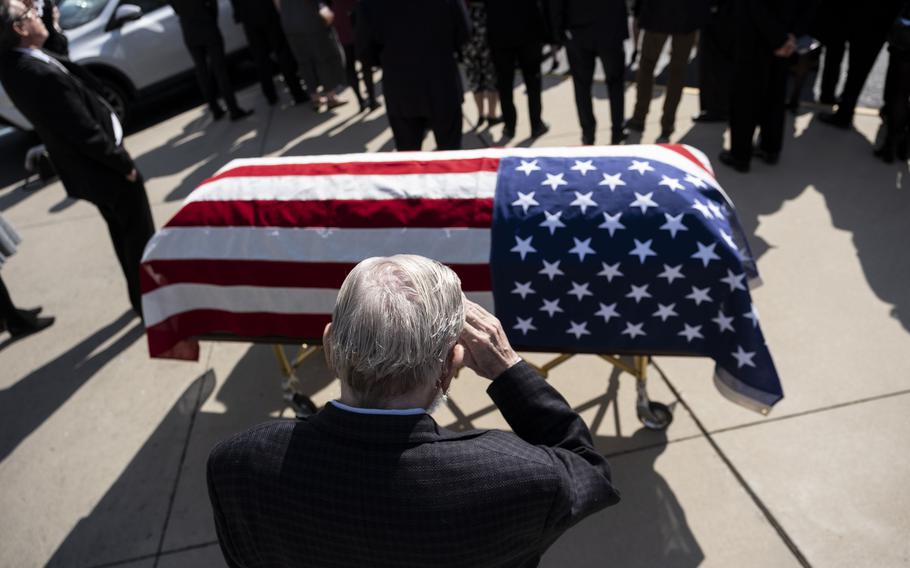
Robert Low salutes the casket of James Mulligan Jr. during his funeral Wednesday in Virginia Beach. Mulligan was one of the "Alcatraz 11," a group of American prisoners of war held captive during the Vietnam War. They returned to the U.S. in 1973. (Billy Schuerman)
(Tribune News Service) — Former prisoners of war Cmdr. George Coker and Rear Adm. Bob Shumaker tapped a final “good night and God bless” to Capt. James Mulligan Jr. But this time, they tapped the coded message to their cellmate of seven years on a church pew rather than the walls of a Vietnamese prison.
More than 400 people gathered Wednesday at Virginia Beach’s Church of the Holy Family for the funeral Mass of the retired Navy captain, celebrating Mulligan’s life and honoring the hell he endured.
“I thank you, Dad, for your love, sage advice, your example, your encouragement, your friendship — and for making it home. But most of all, thank you for your steadfast service and sacrifice and for serving as an example to all to never quit and never waiver when defending the American creed,” said James “Jim” Mulligan III during his father’s service.
Mulligan, who was 96 when he died Jan. 18, was one of three of the remaining “Alcatraz 11″ — American service members held captive for more than seven years by the North Vietnamese. Singled out as troublemakers, they were taken from the main prison complex in Hanoi and boarded in solitary confinement at a building the Americans dubbed Alcatraz.
Mulligan, a pilot, was shot down March 20, 1966, and held for 2,522 days. He was often starved and beaten, with his wrists bound with gasoline-soaked ropes. He endured leg irons for 26 months and over 42 months of solitary confinement. Sunday, would have been the 50th anniversary of his release.
“American’s know Feb. 12 as Super Bowl Sunday, but I first and foremost will remember Feb. 12 as the day my father was once more a free man,” Jim Mulligan said.
Mulligan was among the first roughly 135 Americans released by North Vietnam on Feb. 12, 1973. Three days later, Mulligan and two other POWs — Jeremiah Denton and George Coker — would touch down in Norfolk.
“The word ‘hero’ is tossed around like candy on Halloween. But when I looked at (Mulligan), he was a real American hero — the epitome of the warrior patriot,” said Charles Hartig, a former reporter who covered the POWs’ return to Hampton Roads in February 1973 and filed subsequent stories for a number of years..
Following his release, Mulligan served in the Navy for another two years before retiring in July1975.
Having served on active duty throughout World War II, Korea and Vietnam, Mulligan accumulated over 5,000 single flying hours and made 650 arrested carrier landings. His career spanned six Mediterranean deployments, plus the Bay of Pigs and Cuban Missile crises prior to his West Pacific deployment on the USS Enterprise to Vietnam. It was there he was serving when, on his 80th mission, he was shot down and captured on March 20, 1966.
In the 1980s Mulligan penned “The Hanoi Commitment,” which detailed the horrors and heroism of Americans’ captivity in Vietnam. When it was released, he called Hartig, who did a series on the book, which he called “the most definitive description of a POW experience.”
“In talking to him, I wondered, ‘How did you do it? How did you survive?’ and I am convinced it was based on his unyielding faith, and his love of country and family. He simply wanted to come home, to return to Louise and his sons,” Hartig said.
When Hartig asked Mulligan if he would do it all over again, he said Mulligan answered without hesitation: “Absolutely.”
“This love of country and this deep faith is a reminder to all of us how lucky we are. They embodied what is best about this country — the best, the brightest and the most courageous. I am not sure how many are left, probably not a whole lot,” Hartig said.
Mulligan was preceded in death by his wife of over 73 years, Louise Kolce and sons, Kevin John and Terrance Adam Mulligan. He leaves surviving sons Jim, Mark, Sean, and Neil, as well as six daughters-in-law and a host of grandchildren and great-grandchildren.
At the conclusion of Jim’s tribute, Coker and Shumaker’s coded message seemed to echo through the sanctuary of the church, eliciting soft sobs.
Coker said the Alcatraz 11 shared the good night message each night they were held captive, tapping the code “GN, GB” on the walls.
“You didn’t know if you were going to be alive the next day. That was a real unknown ... All we knew what right now we were together, so have a good night, God bless you, you are in our hearts and we hope we see you tomorrow,” Coker said.
Following the Mass, the guests were ushered outside to witness Mulligan, whose casket was draped with the American flag, receive full military honors, including a 21-gun salute and a Navy flyover.
A sailor handed the folded flag to the Mulligan family. The sailor began, “On behalf of the President of the United States, the United States Navy and a grateful nation ...”
Inside the reception area of the church, a portrait of Mulligan was on display alongside a copy of “The Hanoi Commitment.”
A passage reads: “I looked at the scars on my wrists from the ropes and the gasoline. I thought of the torture, the beatings, the starvation and loneliness. The utter misery of 42 months in solitary confinement. I thought of them all, but mostly, I thought about the countless others who wouldn’t return.”
©2023 The Virginian-Pilot.
Visit pilotonline.com.
Distributed by Tribune Content Agency, LLC.